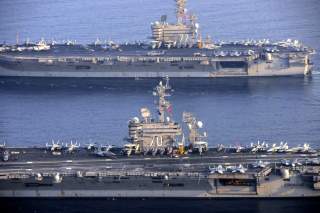Speaking Honestly about China's Rising Military Could Get You in Hot Water
“Did China pressure the White House to fire U.S. Navy Captain James Fanell as the top intelligence officer in the Navy’s Pacific Fleet?”
Did China pressure the White House to fire U.S. Navy Captain James Fanell as the top intelligence officer in the Navy’s Pacific Fleet? Or did a self-censoring Pentagon simply do the deed on its own, based on trumped up charges of “revealing classified information.” Methinks Congress—and this nation—needs to get to the very bottom of a shortsighted decision that has profound, long-term implications for the Obama administration’s much-ballyhooed Asia “pivot.”
In fact, Fanell was one of the few top-ranking officers willing to blow the whistle on China’s own ongoing “Crimea moment” in the East and South China Seas. His sin was to go public last February in San Diego at one of the largest annual conferences attended by military personnel and scholars.
Ironically, this WEST 2014 meeting of the minds was sponsored by the U.S. Naval Research Institute. Its stated mission is “to provide an independent forum for those who dare to … speak… to advance …understanding of … issues critical to national defense.”
As to exactly what the good captain “dared to say” that got him fired, he quite accurately pointed out China is aggressively seeking to expand its territory and maritime rights in the East and South China Sea at the expense of virtually all its neighbors—and the U.S. military. In addition, based on his analysis of a Chinese amphibious exercise involving some 40,000 troops—one widely reported in the press—Fanell also stated China was preparing for “a short, sharp war” against Japan.
There is no question about the veracity of Fanell’s statements. Nor is anything he said “classified information,” as anyone can come to exactly the same conclusions from reports in this publication and in many others.
Indeed, the only thing Captain Fanell appears guilty of is telling a hard truth in an administration that apparently believes taking a soft line on Chinese expansionism is a better strategy. While that is debatable, firing an officer for speaking the truth at an academic conference is not just plain stupid; it also runs directly against the grain of the kind of free and open democracy the United States is supposed to be.
Here are two chillingly practical implications based on the Fanell situation. First, no military officer is ever going to tell uncomfortable truths to the American public while in uniform if he or she wants to keep adding stripes to the sleeve.
Second, no future conference putatively pledged to daring to speak the truth will ever have any credibility. Instead, such conferences will be seen, and rightly, as forums for the propaganda and spin of whoever is sitting in the White House or running the Department of Defense.
That said, here’s the far bigger implication: In firing Fanell, the Pentagon—already under the siege of sequestration—has shot itself in the budgetary head. Indeed, if American taxpayers are going to be counted on to foot the defense-budget bill, they certainly must be kept in the national-security loop. Absent candor on the growing China challenge, it will be impossible for the U.S. Navy to ever get the kind of budget support it is will need to truly pivot to Asia.
To this point, the putatively pivoting White House is doing a dandy version of “Honey, I shrunk the navy.” The U.S. fleet is down from a peak of 600 ships during the Reagan years to well below 300; and could be on its way to breaking the 200-ship barrier—unless you pad the count with hospital ships as the Pentagon has started to do.
To understand the looming problem, just work through this “pivot math”: President Obama has pledged to shift 60 percent of the fleet to Asia from an original 50 percent. However, 60 percent of a shrinking fleet will mean that by 2020 the United States will have fewer ships in the Pacific than it does now. That sounds more like a retreat than a pivot.
So how about we get to the bottom of a seemingly small story that might otherwise quickly die? There is indeed far more at stake here than one man’s career. Let the Congressional hearings begin.
Peter Navarro is a business professor at the University of California-Irvine and director of the Netflix documentary Death By China.
Image: Flickr/Official U.S. Navy/CC by 2.0

